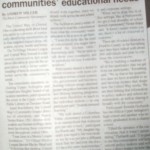ThisWeek UA 3/10/2011
The United Way of Central Ohio is educating itself about local education as a process of continually identifying opportunities in its four targeted impact areas: education, income, health and home.
The TriVillage Mentor League and United Way hosted a community conversation last week about education to provide the organization with a better understanding of how its resources can greater serve the community’s needs.
Ten community members, including Upper Arlington and Grandview Heights’ board of education members, participated in the event at the Upper Arlington Public Library on Tremont Road.
Janet Ravnebery, the United Way’s Community Impact Director of Education, Nancy Nester-Baker, The Ohio State University Director of Education and Human Ecology, have been facilitating these conversations throughout central Ohio since August.
“I met Janet at a Mentor League fundraiser,” TriVillage Mentor League director Hayley Head said. “Following that meeting, [Grandview Heights Superintendent] Ed O’Reilly made the suggestion that [TVML and the United Way] should work together, since we already work across the area school systems.”
The facilitators used a series of questions to lead the conversation from what the community wants education to be to how to get there.
“I want this to be like the kind of conversation you might have around the kitchen table,” Ravneberg said. “We’re here to talk about your community and its aspirations for how it educates residents.”
At this conversation, participants shared a desire to stretch resources with more collaboration across school systems, city government and business; funding without strings attached; greater integration between schools and lifelong learning programs; and more flexibility to teach to the individual student, not tracks – as one participant said, “student-centered learning.”
“My kids’ attend a Columbus Public elementary school which is so standardized that everyone gets put into a track,” participant Joe Roush said. “My daughter regularly tests equal to her twin brother, but he was put into a different track than her and now she doesn’t have the same opportunities.”
To date, Ravneberg and Nester-Baker have facilitated 35 of these conversations, both in community and corporate settings.
“When we’ve done this in office settings, like at Nationwide, we get a real diversity of school districts represented,” Nester-Baker said. “It doesn’t matter where you are, there’s a lot of crossover of concerns.”
There are 16 school districts in Franklin County; so far Ravneberg said they have talked with about 400 individuals and plan to continue the conversations indefinitely.
“We’re building a database of all of this qualitative data we get from our participants,” Ravneberg said. “We tie that to the quantitative data we have available to us and develop themes that shape how the United Way works. We are then linking that information to policy makers and school administrators, as well as sharing it broadly with the community.”
Participant Brenda Gerhardt has one child at Upper Arlington’s high school and another that recently graduated from a charter school.
“I liked the openness of the conversation, that it wasn’t intimidating,” Gerhardt said. “I’m glad to see this conversation will help inform policy makers and will have a direct impact on how [the United Way] proceeds with working with the community.”
